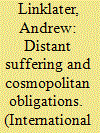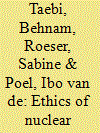| Srl | Item |
| 1 |
ID:
137542


|
|
|
|
|
| Summary/Abstract |
The literal translation of avant-garde from French is ‘foreguard’. While the front has been diversely defined in various permutations of the movement, the cutting edge of avant-garde theatre in China and many post-socialist countries is largely retrospective and anti-futuristic. This is particularly true for the campus-based fringe theatre of the early 1990s, which is regarded as the highlight of avant-garde theatre in China. An alternative venue spearheaded by young theatre artists, avant-garde fringe theatre is notable for unpacking the cultural and political constructs of the Chinese socialist period as it played out through the artists’ own formative experiences. Directed by Meng Jinghu, I Love XXX chronicles the moral emotions that are central to a generation’s self-identity. The play, which is composed of more than 700 parallel sentences prefixed with ‘I love’, presents a meticulously constructed emotional archive of the generation that was born in the late socialist period and came of age in post-socialist China. Imitating rites of passage and classroom drills, the play effectively illuminates the impact affective education had on an individual’s self-perception. The fact that the play was revived in 2013 – 19 years after its initial appearance – proves its enduring relevance in contemporary China.
|
|
|
|
|
|
|
|
|
|
|
|
|
|
|
|
| 2 |
ID:
079468


|
|
|
|
|
| Publication |
2007.
|
| Summary/Abstract |
How far does globalization extend the boundaries of community by bringing distant suffering directly into the lives of onlookers, and how far does the greater visibility of suffering arouse compassion and a willingness to help? Modern self-images that stress the growth of emotional identification between the members of the same society encourage the belief that similar attachments may develop at the level of humanity as a whole. Critics of this position emphasize deep-seated tendencies to remain indifferent to remote suffering. In the light of these differences, this paper asks whether the extension of human solidarity largely depends on the development of feelings of guilt or shame when harm is done to 'distant strangers' or when little is done to help them. It asks whether universal vulnerabilities to basic forms of mental and physical suffering create the possibility of global empathy and sympathy, and whether the idea of 'embodied cosmopolitanism' provides adequate normative foundations for collective action to reduce unnecessary suffering in distant places
|
|
|
|
|
|
|
|
|
|
|
|
|
|
|
|
| 3 |
ID:
116932


|
|
|
|
|
| Publication |
2012.
|
| Summary/Abstract |
In this paper we argue that traditional approaches to risk assessment should be supplemented by an explicit discussion of the moral acceptability of nuclear technology and the risks it poses. The introduction of nuclear energy in society should be seen as an ongoing social experiment, whose (moral) acceptability should continuously be addressed. Given the long-term risks of nuclear energy, intergenerational justice should be explicitly included in such an analysis. This will also have implications for nuclear power policies. Furthermore, emotions such as sympathy and feelings of responsibility can provide moral insights; they should be taken seriously in the debate about nuclear energy rather than being dismissed as irrational distractions as is currently the case. These proposed reforms would help society to move beyond the usual stalemate in the debate about nuclear power.
|
|
|
|
|
|
|
|
|
|
|
|
|
|
|
|
| 4 |
ID:
093602


|
|
|
|
|
| Publication |
2010.
|
| Summary/Abstract |
Although prolonged occupation of a nation is no longer a common phenomenon, where it does exist, it bears harsh implications for all parties involved. This article examines the socio-psychological implications of occupation on the occupying society, using the case of the Israeli occupation of the Palestinian territories of the West Bank and Gaza Strip since 1967 as an example. The article first delineates the concept of occupation from a socio-psychological perspective, which supplements the legal-formal aspect. The authors then propose a conceptual framework that analyzes the psychology of the occupying society. Within this framework, they describe the psychological challenges that the occupation may pose to the members of the occupying society. Next, they introduce psychological mechanisms that members of an occupying society may use in order to avoid facing these challenges. Finally, they offer a number of ideas regarding the relationship between these mechanisms and the process of ending the occupation.
|
|
|
|
|
|
|
|
|
|
|
|
|
|
|
|